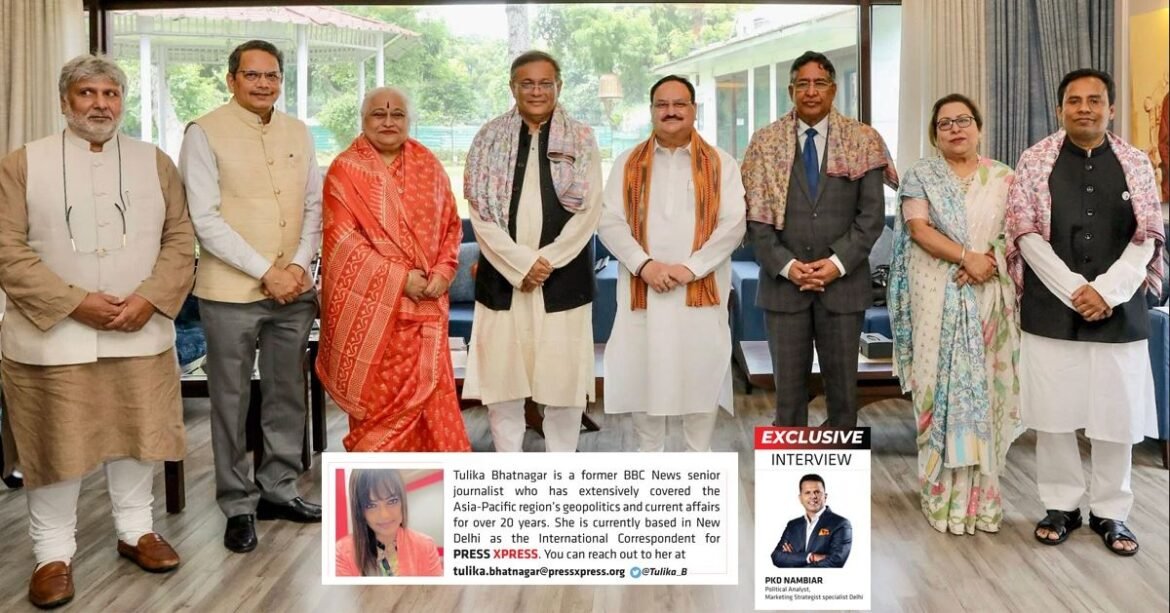Bangladesh’s Information and Broadcasting Minister Hasan Mahmud, who is in India as part of the ruling Awami League party’s delegation visit to India, has said that “continuity in strong Indo-Bangla ties” is one of the biggest takeaways of the visit.
Speaking exclusively to Press Xpress, Mahmud stressed that “we have cooperation between India and Bangladesh governments for a very, very long time”. This has strengthened under the leadership of Bangladesh Prime Minister Sheikh Hasina and her Indian counterpart Prime Minister Narendra Modi. And the current visit has only strengthened this bond, he added.
Mahmud is part of a five-member delegation, which is being led by Bangladesh Agriculture Minister Abdur Razzaque, and also includes Awami League Organising Secretary Sujit Roy Nandi and lawmakers Aroma Dutta and Marina Jahan. The visit concludes on 9 August.
Political stability
Both the countries are headed to a general election next year, which will have a significant impact on regional political stability, experts say.
According to PKD Nambiar, political analyst, author and serial entrepreneur, India’s recent official comment highlighting a “very close relationship” with Bangladesh holds special significance in view of the United States’ stand on the matter.
“I find it quite natural that the Ministry of External Affairs came up with an official statement stating, ‘World may comment on Bangladesh election but India has very special relationship with Bangladesh’,” Nambiar told PressXpress.
Read full interview here: Taking stock of India, Bangladesh ties: the triumphs and the tribulations
Nambiar said “friendly nations like India had to come up with a statement like this to make their position clear”, especially when countries like the United States made statements seeking free and fair election in Bangladesh and even issuing a new, restrictive visa policy against anyone it felt was undermining the democratic election process.
“Meddling in internal affairs of another democratic nation has never been on India’s agenda,” Nambiar added.
In a significant development, India’s Commerce Minister Piyush Goyal also told the visiting delegation in a meeting on 8 August, that India doesn’t want “any inimical forces to come to power, which patronise radicalisation and militancy”.
“India believes that Bangladesh has progressed tremendously on the last decade under the current leadership, which should continue,” Goyal said, in a direct statement of support for PM Shekh Hasina-led government in Dhaka.

Indo-Bangla ties
According to Mahmud, bilateral relations between India and Bangladesh are at their best right now.
There is a new dimension to the ties with the recent decision to do trade exchange in local currencies of Rupee and Taka, Mahmud said.
Read more at: De-dollarization: Delhi, Dhaka choose global trade, local currency
However, concerns on other issues remain.
The delegation conveyed to Indian leaders that a sudden ban on export of essential items such as onion and wheat from India often raises “uncomfortable questions” for Prime Minister Sheikh Hasina who is seen as pro-India.
Price rise of everyday items is on a spiral in Bangladesh currently, and is eating up into people’s food prices. According to the Bangladesh Bureau of Statistics, inflation in July was at 9.69% compared to 7.48% for the same period last year.
For food inflation, which has been on a spiral due to the ongoing Russia-Ukraine war, a high taka-dollar exchange rate, and a price hike in global markets, India will likely fix an annual quota for wheat, onion, and other essential commodities to avoid future supply shocks.

Another issue that has failed to see much progress over the years is the proposed Teesta river water sharing agreement.
While the visiting delegation did not comment on this issue, Bangladesh’ High Commissioner to India Mustafizur Rahman mentioned it in a press briefing last month. Speaking in Delhi at the Foreign Correspondents Club of South Asia, Rahman acknowledged that the two countries still need to collaborate more on refugee repatriation and Teesta water sharing. He voiced hope that some progress will soon be achieved in both the areas.
Not a one-way road
Mahmud said that “continuity in our strong ties” is the hallmark of Indo-Bangla relations and that is what he expected to carry forward after the delegation’s visit.
But there are no specific announcements for now or any call-to-action points as a direct result of the talks during the visit. These will likely get materialised as progress on mutual work continues, Mahmud told Press Xpress in an exclusive conversation. Most political analysts say that while India is keeping a close watch on the forthcoming election in Bangladesh, it is also generally believed that most opposition parties in the neighbouring country are currently in a state of disarray. There is also a general consensus that the ruling Awami League government is seen as a strong factor for geopolitical stability in the region.

Some point out that there is a general notion that India is uncomfortable with Bangladesh developing closer ties with China. But Nambiar disagrees.
“In 2018, Prime Minister Shaikh Hasina had made it clear publicly that India need not worry about the newfound Sino-Bangladesh bilateral relationship, because Bangladesh was only seeking economic help to develop the nation and any country, from China to Middle East, was welcome to contribute to making Bangladesh a prosperous modern nation,” he said.
“PM Hasina has repeatedly asserted on the ‘excellent’ ties between India and Bangladesh and how they have solved maritime and border issues peacefully and with patience. So, I believe there is nothing to be jittery about Bangladesh tilting towards China as they will never be in a position to ignore India, a nation which has stood by it for decades,” he added.
It’s not a one-way road, experts say. For the ties to remain strong in the long run, both sides have to put in efforts. According to Mahmud, “We (The visiting delegation) have discussed everything from political stability in the region, to militancy, to Indo-Bangla ties.”
“But work on all these aspects is a continuous” effort, and “continuity” is what will ensure a stronger future, he said.





